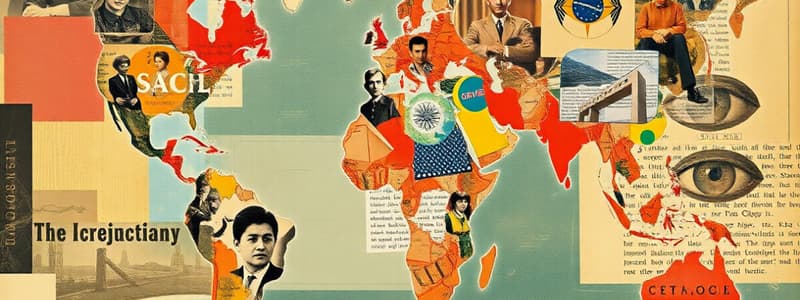Podcast
Questions and Answers
What does Gross National Income (GNI) include that Gross Domestic Product (GDP) does not?
What does Gross National Income (GNI) include that Gross Domestic Product (GDP) does not?
- Income from nonresident sources abroad (correct)
- Income from government operations
- Income from resident sources only
- Total market value of all final goods
Which of the following best describes Purchasing Power Parity (PPP)?
Which of the following best describes Purchasing Power Parity (PPP)?
- An adjustment to GDP reflecting cost of living differences (correct)
- An adjustment to GDP based on population size
- A calculation of income from abroad
- A measure of total income generated within a country
What is the primary focus of the resource-based view in international business?
What is the primary focus of the resource-based view in international business?
- Environments and resources available to firms (correct)
- Institutions and their regulations
- Government policies in host countries
- Consumer behavior trends
Which of the following groups is collectively referred to as BRIC?
Which of the following groups is collectively referred to as BRIC?
Which best defines 'Bottom Billion'?
Which best defines 'Bottom Billion'?
How does formal rule structure impact foreign firms in a host country?
How does formal rule structure impact foreign firms in a host country?
What is meant by 'liability of foreignness'?
What is meant by 'liability of foreignness'?
Which region is not part of the 'Triad'?
Which region is not part of the 'Triad'?
What differentiates global business from international business?
What differentiates global business from international business?
Which term has gradually replaced 'developing countries' since the 1990s?
Which term has gradually replaced 'developing countries' since the 1990s?
What is an example of Foreign Direct Investment (FDI)?
What is an example of Foreign Direct Investment (FDI)?
Why is it important to study global business?
Why is it important to study global business?
What characterizes a Multinational Enterprise (MNE)?
What characterizes a Multinational Enterprise (MNE)?
What does the infant industry argument advocate for?
What does the infant industry argument advocate for?
What are nontariff barriers (NTBs)?
What are nontariff barriers (NTBs)?
Which of the following best describes a trade embargo?
Which of the following best describes a trade embargo?
What do import quotas restrict?
What do import quotas restrict?
What is the purpose of an antidumping duty?
What is the purpose of an antidumping duty?
Which statement correctly describes a voluntary export restraint (VER)?
Which statement correctly describes a voluntary export restraint (VER)?
What is a significant consequence of import tariffs?
What is a significant consequence of import tariffs?
Which of the following is an example of an administrative policy?
Which of the following is an example of an administrative policy?
What is the theory of mercantilism primarily concerned with?
What is the theory of mercantilism primarily concerned with?
What is the concept of opportunity cost in the context of comparative advantage?
What is the concept of opportunity cost in the context of comparative advantage?
Which of the following best describes the modern trade theory of product life cycles?
Which of the following best describes the modern trade theory of product life cycles?
How does the theory of absolute advantage differ from comparative advantage?
How does the theory of absolute advantage differ from comparative advantage?
Which factor is central to the Heckscher-Ohlin theory?
Which factor is central to the Heckscher-Ohlin theory?
What happens when a nation has a trade deficit?
What happens when a nation has a trade deficit?
What is one potential benefit of being a first mover in a market according to strategic trade theory?
What is one potential benefit of being a first mover in a market according to strategic trade theory?
What is a key characteristic of protectionism in international trade?
What is a key characteristic of protectionism in international trade?
In terms of trade theories, what does the term 'balance of trade' refer to?
In terms of trade theories, what does the term 'balance of trade' refer to?
Which theory suggests that strategic intervention by governments can lead to international success in specific industries?
Which theory suggests that strategic intervention by governments can lead to international success in specific industries?
Flashcards
International Business
International Business
A business that operates across national borders.
Global Business
Global Business
Business activities that involve both international and domestic operations.
Multinational Enterprise (MNE)
Multinational Enterprise (MNE)
A company that owns or controls production or services in multiple countries.
Foreign Direct Investment (FDI)
Foreign Direct Investment (FDI)
Signup and view all the flashcards
Emerging Economies
Emerging Economies
Signup and view all the flashcards
Gross National Product (GNP)
Gross National Product (GNP)
Signup and view all the flashcards
Gross Domestic Product (GDP)
Gross Domestic Product (GDP)
Signup and view all the flashcards
Gross National Income (GNI)
Gross National Income (GNI)
Signup and view all the flashcards
Purchasing Power Parity (PPP)
Purchasing Power Parity (PPP)
Signup and view all the flashcards
Triad
Triad
Signup and view all the flashcards
BRIC
BRIC
Signup and view all the flashcards
Group of 20
Group of 20
Signup and view all the flashcards
Base of the Pyramid
Base of the Pyramid
Signup and view all the flashcards
National Competitive Advantage
National Competitive Advantage
Signup and view all the flashcards
Tariff Barrier
Tariff Barrier
Signup and view all the flashcards
Import Tariff
Import Tariff
Signup and view all the flashcards
Deadweight Cost
Deadweight Cost
Signup and view all the flashcards
Nontariff Barrier (NTB)
Nontariff Barrier (NTB)
Signup and view all the flashcards
Import Quota
Import Quota
Signup and view all the flashcards
Voluntary Export Restraint (VER)
Voluntary Export Restraint (VER)
Signup and view all the flashcards
Infant Industry Argument
Infant Industry Argument
Signup and view all the flashcards
Trade Deficit
Trade Deficit
Signup and view all the flashcards
Trade Surplus
Trade Surplus
Signup and view all the flashcards
Mercantilism
Mercantilism
Signup and view all the flashcards
Absolute Advantage
Absolute Advantage
Signup and view all the flashcards
Comparative Advantage
Comparative Advantage
Signup and view all the flashcards
Opportunity Cost
Opportunity Cost
Signup and view all the flashcards
Factor Endowment Theory
Factor Endowment Theory
Signup and view all the flashcards
Product Life Cycle Theory
Product Life Cycle Theory
Signup and view all the flashcards
Strategic Trade Theory
Strategic Trade Theory
Signup and view all the flashcards
First-Mover Advantage
First-Mover Advantage
Signup and view all the flashcards
Study Notes
Chapter 1: Globalizing Business
-
Global business encompasses both international and domestic business activities.
-
International business is a firm engaged in cross-border economic activities or doing business abroad.
-
Multinational enterprise (MNE) is a firm that invests in foreign direct investment (FDI) to manage and control value-adding activities in other countries.
-
FDI includes investments in controlling and managing value added activities in other countries.
-
Global business includes domestic firms competing or collaborating with foreign firms.
-
Emerging economies focus on understanding the importance of economies other than developed ones.
-
Emerging economies have gradually replaced "developing countries" in the 1990s.
-
Key economic terms for understanding global business operations include:
- Gross National Product (GNP)
- Gross Domestic Product (GDP)
- Gross National Income (GNI)
- Purchasing Power Parity (PPP)
-
Key terms for emerging economies include:
- Triad (North America, Western Europe, and Japan)
- BRIC (Brazil, Russia, India, and China)
- Group of 20 (G20)
-
Figure 1.1 displays the contributions of emerging economies relative to developed economies across various categories.
-
The "base of the pyramid" encompasses the vast majority of the world's population, making under $2,000 annually.
-
The "bottom billion" comprises 58 countries concentrated in Africa and Central Asia, facing issues with growth, incomes, and human development.
-
Developed and emerging economies are often classified by bodies such as the IMF.
-
Studying global business improves employability and career advancement within the global economy.
-
Expatriate managers are those who work abroad, often receiving an international premium package for additional compensation.
-
Key perspectives in global business include the institution-based view and the resource-based view..
- An institution-based view outlines that firm success and failure are constrained by institutions. Formal and informal rules are relevant to this viewpoint.
- A resource-based view highlights that firm success and failure are determined by environmental factors, such as a firm's resources and capabilities. Liability of foreignness is the innate disadvantage foreign firms experience as they establish a presence in a foreign host country.
-
Globalization can be viewed as a new force, a long-running historical evolution, or as a pendulum swinging between extremes.
-
Semiglobalization suggests that barriers to market integration are high but not enough to isolate countries completely.
-
Risk management involves identifying and assessing risks to minimize the impact of high-risk events.
-
Scenario planning is a technique for preparing and planning for multiple scenarios.
-
Students' and the general public's viewpoints on globalization vary.
-
NGOs, or nongovernmental organizations, are categorized by their role as either advocacy groups, focused on environmental issues or human rights, etc, or as operational organizations, designing and implementing development programs.
Learning Objectives
- Explain international business and global business, focusing on emerging economies.
- Articulate the reasons for studying global business (e.g., employability).
- Identify the core perspectives in global business research (e.g., institutional & resource-based).
- Articulate three ways of understanding globalization.
Studying That Suits You
Use AI to generate personalized quizzes and flashcards to suit your learning preferences.




